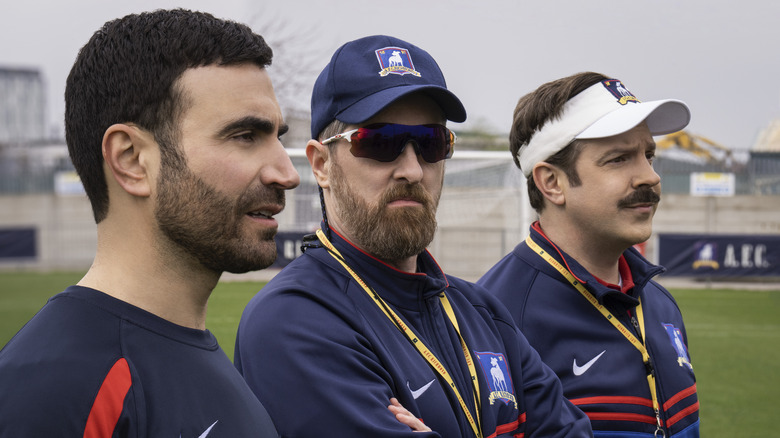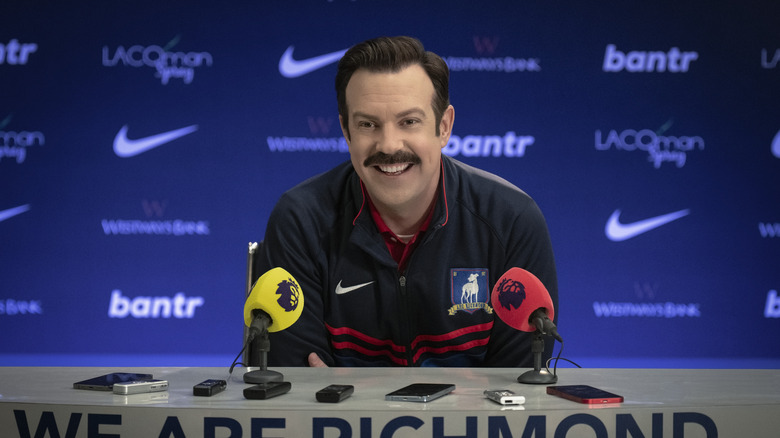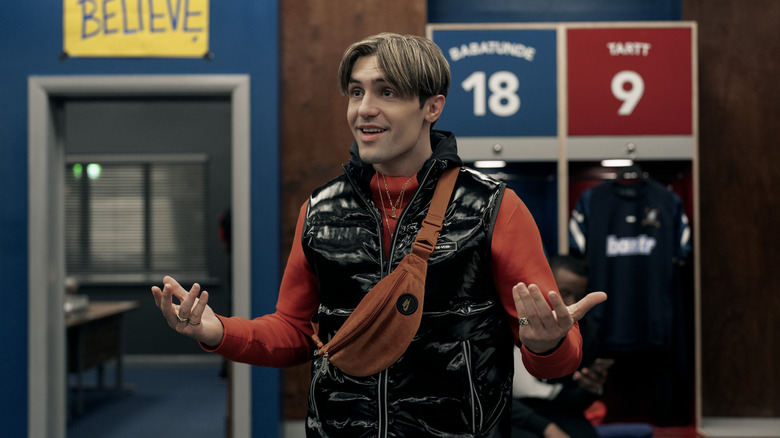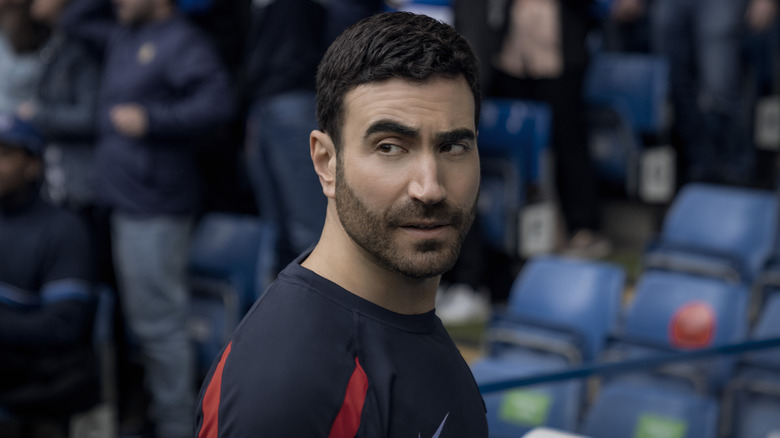Ted Lasso Likes Its Characters Too Much To Let Them Suffer & That's A Growing Problem
This article contains spoilers for "Ted Lasso" Season 3, Episodes 1, 2, and 3.
In the first episode of "Ted Lasso" Season 3, our titular mustachioed football coach, played by Jason Sudeikis, wonders why he's still trucking. After journeying across the proverbial pond to coach the hopeless Richmond team, Ted helped them achieve greatness on the pitch by teaching them to fix their hearts. Now, although there is a new battle ahead for Richmond to win the Premiere League, Ted worries that's outside the scope of his mission. "I know why I came," he says, "but it's the sticking around I can't quite figure out."
If Ted's anxieties betray a suspicion on the part of the show's writers that they've overstayed their welcome, they aren't wrong to wonder. What makes any story engaging are the choices its characters make, and often they must make the wrong choices in order to carry the plot forward. That's especially true of "Ted Lasso," where the real narrative is not the sport of football but rather the emotional struggles faced by its characters. The issue is that those characters have all become so emotionally mature over the previous two seasons that the show cannot let them make unhealthy choices anymore. Or, more accurately, it won't let them.
Season 3 of "Ted Lasso" spends its first three episodes flailing for a way forward. Every member of the cast is as excellent as they've always been, yet are given little of interest to do with themselves. The problem is exactly as Ted says: the show already accomplished what it set out to do and appears unsure where to go from here. And so, for the season to bounce back like AFC Richmond itself, it must broaden its approach to storytelling.
Perfect people are great in real life, but boring to watch
As audiences of Western storytelling conventions, we are primed to expect character development from the fictional media we consume. A character starts with wants and needs, often in conflict with one another, then must overcome obstacles to reach the need and resolve they want.
On television, our sense of character development is often a false one. Characters who must appear week after week cannot become the best versions of themselves because once they achieve their potential, there's no more story to tell. And so, they reset like pieces on a chess board, learning a lesson one week only to have seemingly forgotten it the next.
Comedies like "Seinfeld" or its spiritual successor "It's Always Sunny in Philadelphia" took advantage of that Sisyphean character arc by giving us characters whose lack of growth is the point. They receive endless comeuppances but never learn from them, like live-action Wile E. Coyotes who insist on chasing the Roadrunner no matter how many anvils get dropped on their heads. "Ted Lasso," by contrast, is the anti-"Always Sunny." It insists with the exuberance of a sports announcer that people can always learn from their past mistakes and evolve into better, healthier ways of being. Even the theme song declares, "Heaven knows I've tried." That heartwarming sincerity is what makes the show tick and won it a raft of Emmys. But it also gives "Ted Lasso" a predetermined shelf life. Once healed, these characters struggle to be engaging.
Watching "Ted Lasso" try to inject some real stakes into the current state of affairs is a bit like watching someone try to mess with the Royal Guards at Buckingham Palace. You can blow as many air horns as you like, but they'll never flinch.
Everyone trusts each other now on Ted Lasso, and we're all very tired
For the clearest example of this problem, consider Roy Kent (Brett Goldstein). He's broken up with Keeley (Juno Temple), and while neither is thrilled, they're both handling it with grace. The Roy Kent of Season 1 would be a raging mess, but Season 3 Roy has contained himself to his signature growls. He's also feeling some remorse over his retirement from football but doesn't get worked up about it. Good for you, Roy! Too bad your personal growth makes you tedious.
Then there's Jamie, who's still a blast to watch thanks to Phil Dunster's unparalleled enthusiasm in the role. Dunster has a bit more to work with than Goldstein, displaced as Richmond's star by the addition of international football legend Zava (Maximilian Osinski). But Jamie is no longer the reflection-gazing narcissist we saw in previous seasons. Unfortunately, he too studied at the Coach Lasso school of emotional maturity and is resultingly a narrative wet blanket reduced to pouting from the sidelines.
Osinski, meanwhile, is the most engaging presence every time he's on camera. Zava has been written as a self-absorbed, goal-scoring force of nature — basically what Jamie was in Season 1 turned up to 11 — and the show uses him to unleash some of its best laughs. When Zava appears to be joining a team hand-stack, only to walk into the circle of players until they appear in supplication to him as a Christ figure? Pure gold. When he shows up wearing a shirt that says, "Zava & Zava & Zava & Zava," it's made even better by the fact no one notices.
The best comedy often comes from characters who lack self-awareness. Zava gets to exploit that gap. The rest of the roster don't.
Ted Lasso now gives us Diamond dogs and depressed horses
For purposes of comparison, consider a different show like "BoJack Horseman," another ensemble sitcom titled after its lead character which explores issues of mental health and emotional maturity. Like "Ted Lasso," its characters have deeply unresolved issues, and its protagonist uses humor to cover up an underlying pain. And like Coach Lasso and his Richmond crew, BoJack and his friends are miserable despite their privilege and success.
Yet "BoJack Horseman" does not pretend that the questions it asks about the human condition have easy, saccharine answers. Its characters suffer in ways that are each more agonizing than the last and do heinous things to each other as a result, lashing out in ways that articulate their pain with such clarity we can feel it ourselves. But even once they recognize the errors of their ways, that new understanding does not prevent them from making further mistakes born of a deeply rooted pathology. Over six seasons, "BoJack Horseman" consistently finds fresh angles from which to approach the same fundamental questions about what makes a person good, fulfilled, or happy, and it comes up with a new answer each time because humans (and anthropomorphized animals) are densely packed with contradictions.
"Ted Lasso" feels afraid to depict such nuance. Its characters are God's perfect little angels and, if they falter, it is only a temporary misalignment from their true and good inner selves. Once they have learned empathy and self-love, they can handle any situation with grace and aplomb. Season 3, which may be the last, therefore plays like a marionette show — everyone is simply going through the motions. Though there are still moments of genius, scripted comedy has rarely felt this scripted.
There's no scoreboard in the game of life
In its current state, the underlying philosophy of "Ted Lasso" is about as deep as an inspirational Instagram post. The problems its characters deal with are allayed by their privilege, the answers they arrive at too cleanly one-dimensional. Its platitude-laden pleas to "Believe!" and "I'm Foghorn Leghorn," or whatever Jason Sudeikis came up with in the writers room after a morning perusal of Gwyneth Paltrow's blog would be tolerable if the show remained solidly in the realm of a sitcom (the fact is that sitcoms like "The Good Place" have mined the same philosophical ore without sacrificing laughs). But "Ted Lasso" insists on pushing further into the realm of drama with each new season — episodes now border on an ad-free hour — and the returns are constantly diminishing.
The show embraces a Panglossian panacea where malice can be overcome with empathy, where everyone has a heart of gold waiting to be excavated, and it cannot allow characters who have begun panning their inner rivers to come up short. To do so would, within its video-game skill progression tree model of personal growth, be tantamount to admitting that such a hollow philosophy is what all of its award-winning prestige was built on.
The irony: Ted himself would never prioritize pride over a lesson well-learned and retaught. Perhaps these early episodes are setting the ground to do just that — to show the increasingly complacent AFC Richmond family in a struggle to maintain the personal growth they've made, and in which they must accept that losing ground in that fight is not a personal failing. Because to grow beyond itself the only way "Ted Lasso" can expand forward. Especially with plans for multiple spin-offs potentially in the works.
Still, a path to victory remains.
Ted Lasso must take its own advice to be the best version of itself
Maybe "Ted Lasso" just wants to do a victory lap. It bred some prize hogs and now it wants to parade them around the fair (is that something people do at fairs? It just seems like something Ted would say). And maybe that would be fine if it were the goal. But then why bother setting up so much potential conflict in the first quarter? Perhaps, like those sports commentators who predicted AFC Richmond would emerge last in the Premiere League, it would be a mistake to write "Ted Lasso" off.
Given how truly magical this show was during its previous two seasons, there's no reason to assume it will fumble the ball this time around. There's a good chance these first several episodes are just setting up the play. But execute such a strategy effectively, it must admit that its soft and saccharine edges were always kneepads covering a bruised and bitter truth. It must allow its characters to sustain new emotional injuries, to lose ground against toxicity on the pitch of personal growth. Only then can they triumph from behind as the underdogs we know and love.





